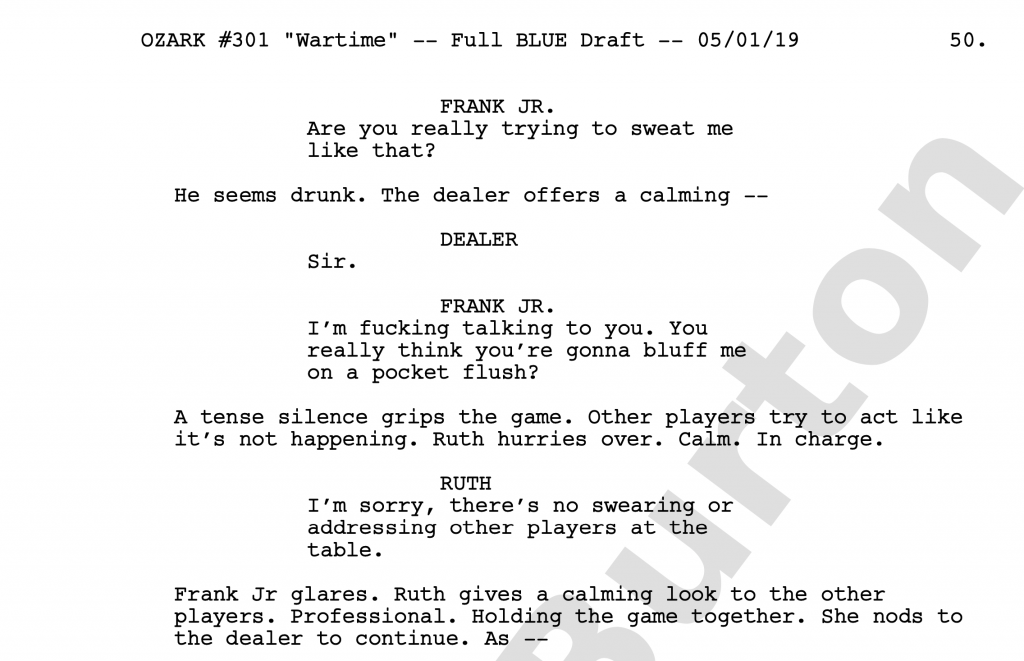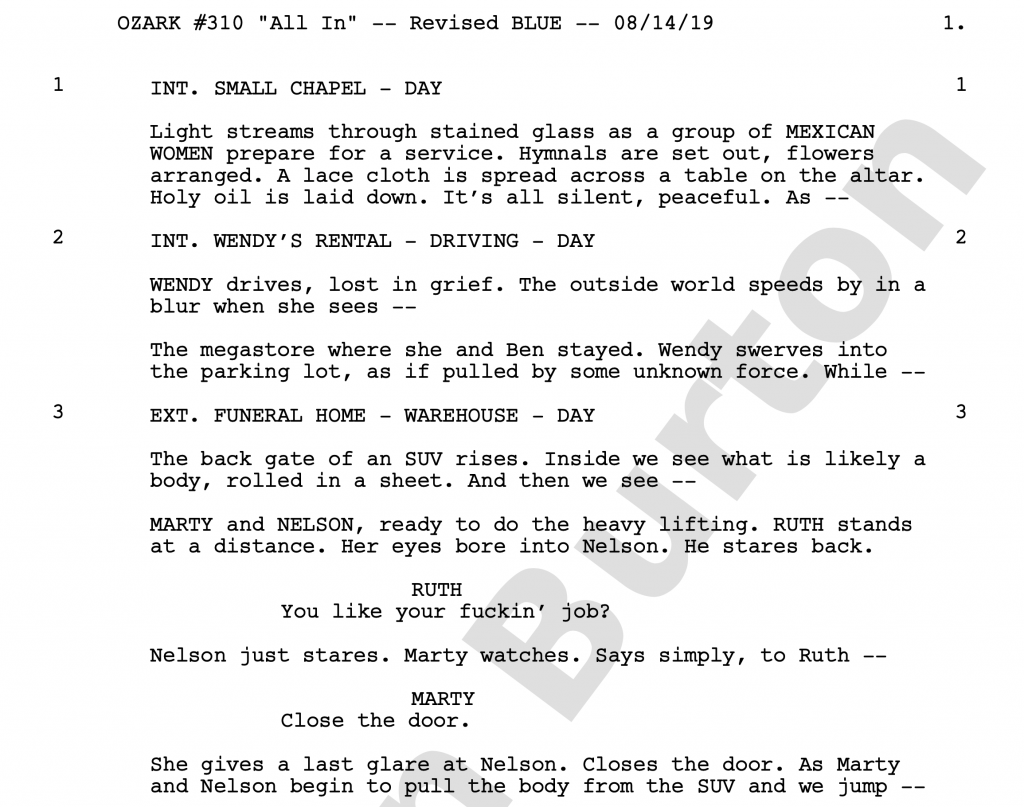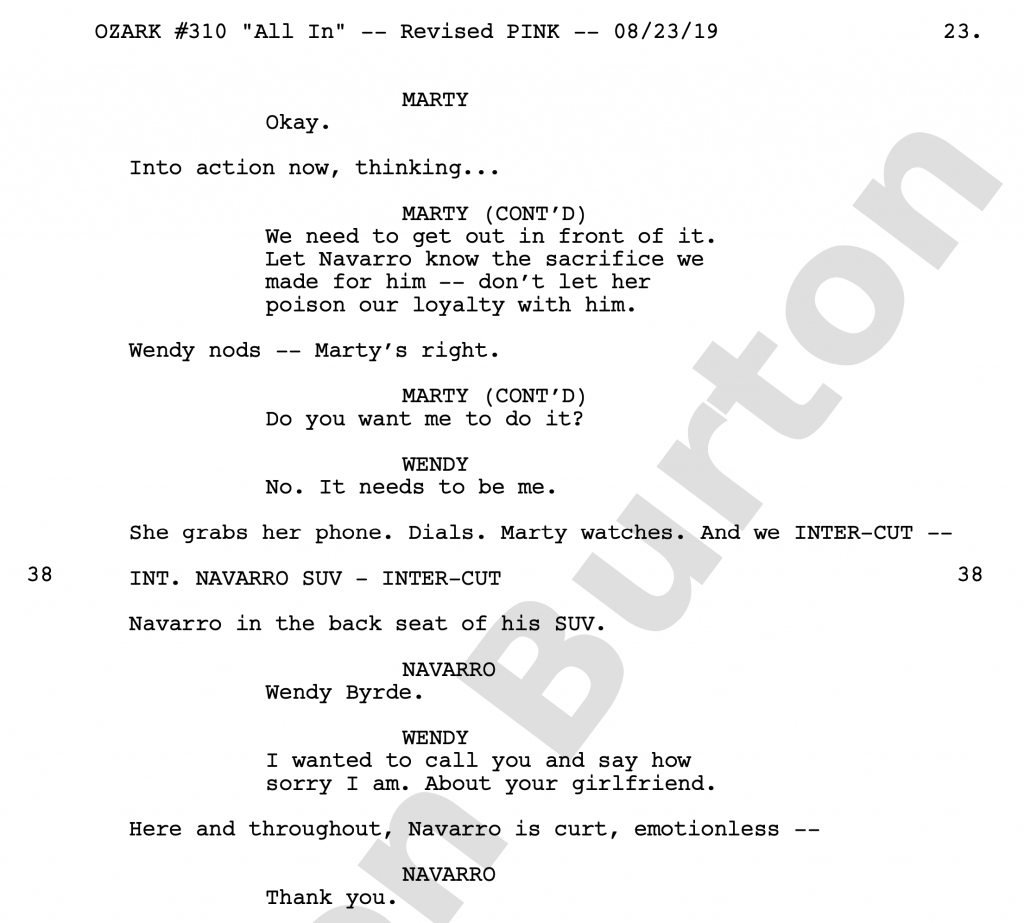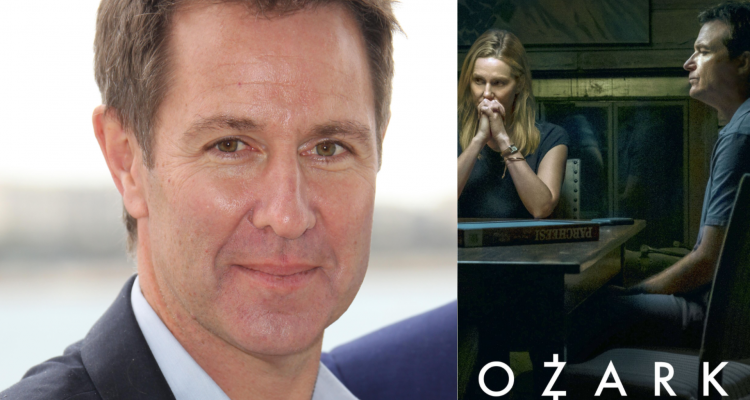The recipe for a cultural phenomenon is not an easy one to replicate, requiring near universal critical acclaim and colossal viewership. Thanks to the dedicated work of Chris Mundy and company, Ozark’s third season has cemented its status in the global zeitgeist. The Nielsen ratings for the season three premiere tripled Netflix’s previous runaway hit Tiger King, and the numbers continued to rise throughout April.
Ozark’s cast and crew are quick to highlight the guidance of Emmy nominated writer/producer/showrunner Chris Mundy as the key to the series’ success. Under Mundy’s supervision, Ozark‘s Emmy nominations have grown from five in season one to eighteen in season three (tied with HBO’s Succession for the most of any series).
This marks the second consecutive year it’s been nominated for Outstanding Drama Series, not to mention last year’s wins last year for Supporting Actress Julia Garner and director Jason Bateman.
Mundy is nominated as a producer for Outstanding Drama Series and for writing the season finale, “All In.” He spoke to Awards Focus about the process of writing the premiere and finale, restructuring the closing of the premiere in post, and how he plans to shape the fourteen episode order of season four.
Awards Focus: We’re all coming to terms with the news that Ozark is renewed for a fourth and final season. How does it feel to close the series with the expanded order for fourteen episodes?
With Breaking Bad, the final season was expanded to sixteen episodes and the first batch of eight episodes premiered a year in advance of the final eight. Should fans expect to wait a year between the batches of seven episodes?
Chris Mundy: There hasn’t been a decision made as to how far apart the two half-seasons will be. It’s tricky, as writers, because we have to think of it as one final act and, yet, we also realize that people are going to experience it as two different viewing experiences. So, there has to be a satisfying end to the first half and the feeling of beginning in the second — and yet it all needs to be rolling down hill toward our conclusion. We’ve talked endlessly about how to pull off both of those things because, on paper, they don’t easily coexist.
AF: We appreciate you sharing that insight as well as the scripts for the season three premiere and finale. You wrote both scripts and you’re being submitted for the Emmy for then finale.
Mundy: You’re welcome, and yeah, we decided to push the finale.
AF: In the premiere episode, you’re setting up a lot of storylines and making introductions. The Frank Jr. storyline with Ruth (Julia Garner), and of course the wonderful therapy storyline for Marty (Jason Bateman) and Wendy (Laura Linney) with the brilliant actress Mary Louise Burke playing Sue the therapist. Sue was probably the biggest treat for viewers this season.
Mundy: Literally every line she said made me laugh. It’s definitely between her and REO Speedwagon.
AF: With the character of Sue, you got the feeling that this is the most excitement she’s had all her life, and unfortunately her insistence on getting involved with the Byrdes leads to a demise that’s become quite common on the show.
When you were writing her part, was it clearly so comedic on the page, or was that brought to life by the performer? How involved are you with the casting, was that something you wanted for that role?
Mundy: Jason and I do all the casting along with Alexa L. Fogel, who’s our casting director who’s truly amazing. I knew that that was that we wanted someone with really good comic timing. We actually had a lot of really good choices for that particular role.
When you find someone like her who’s so good, you don’t need to write as much, you can just kind of let it be. You know what I mean? I’ve always found the better that actor the less words you’ll probably need to write for them just because they’ll deliver so much with just a little bit.
AF: Did you know you wanted someone in the retirement age range?
Mundy: Yeah, we wanted somebody in that age range. It’s funny there was a lot of argument in general about whether or not the therapist character should exist at all, but I felt pretty sure that she should. There was a day in the writers room where we had all these pictures of casinos up for inspiration. There was a picture of this kind of Blue Haired lady who won on a slot machine. One of our writers said, “That’s Sue!” Once she said that, everything came together and we all agreed on everything.
AF: You use music very well in the first episode. Right after the parenting class, Darlene Snell (Lis Emery) is not happy about being downgraded for using baby formula instead of breast milk.
For payback, Darlene slits the other mother’s tire and classical music ushers in the revenge. I know you wrote classical music in the script, but did you have that particular track in mind?
Mundy: It’s funny, one of my favorite things to do in scripts is to reference the music I want to use on the page. Year ago, I music journalist for a long time and I really loved doing that.
In the tire slashing scene, I knew I wanted the sound to be really grand and Jason knows classical music very well. So, I trusted that if I put classical in the description, then Jason would instantly know exactly what it should be.
AF: You wrote a brilliant line for Darlene when she complained about a “Woman hopped up on breast milk.” It’s definitely in the character’s wheelhouse, but also gets laughs. How do you feel when you come up with a line like that and know that Lisa Emery will nail then delivery?
Mundy: The really great thing about Darlene is, is you can put some crazy stuff in her mouth to say and and she just makes it work. Everything we’ve written for Darlene has been a little bit heightened. and Lisa Emery is so good that she can just she grounds it. You can play really funny stuff just with that, you know, you can go a little big and a little with her. and she makes it work.
AF: In the closing moments of the first episode (3×01), originally in the script it had Wendy roaming through the old Byrde house in Chicago intercut with Marty watching Ruth throw Frank Jr. off the boat via security footage. Obviously, the scenes were separated and the episode closed on Laura Linney’s closing moments. Can you talk about that decision in post production?
Mundy: I went back and forth and we talked about it as a group, where should we end the episode. The “muscular” ending would be with Frank Jr. thrown off the boat, which is how the script ends. However, in the edit we found ending on Wendy to be the more psychological ending… it spoke to where we were going this season.
You could say there’s a little less punch in the actual moment, but it offer a much better long term gain for the season. I love how Jason shot episode, letting Wendy walk away until she’s out of focus. He doesn’t rack focus, he doesn’t do anything. He just like lets her go.

AF: Tom Pelphrey was an amazing choice for the role of Wendy’s brother, Ben Davis. I was just thinking that he’s gone by the time you write the finale (3×10) and he’s not in the first episode. So, what is it like when you have a relationship with a character you’ve not directly written for as the showrunner?
Mundy: That’s funny, until you just pointed it out I didn’t even think about the fact that I didn’t technically write anything for Tom, but you’re totally right. As far as being the showrunner, I’m there at every stage, from the breaking and writing to giving the stamp of approval for the last word on every script.
If Tom or any actor has a question about something, they’ll call me about it and we’ll discuss whether it’s big picture or very specific to the episode. Honestly, all of us on the writing staff are pretty intimately involved in all of the scripts. For me, I’ve got a I’ve got to be able to defend every word in every episode.
AF: Once you’re deep in production, do the actors often have more questions at the beginning of the process? Can you talk about how much time you spend on set, working with the other writers, and then finishing up the two scripts you penned for this season? I know there were some adjustments to the shoot this season.
Mundy: I don’t really break from the writers room, so I have to find little times to sneak away and write on my episodes. This year brought a new challenge because we usually block-shoot two episodes at a time. We ended up block shooting the final four episodes (3×07-3×10) at once.
Because of that, we had to have episode ten written at the same time we had seven finishhed, everybody was jamming as fast as they could. It moved up our writing timetable up by a full month.
That’s a very challenging situation for the actors. They were often bouncing between scenes in episode eight, then nine. then to seven. They were all very prepared. We were also lucky that Alik Sakharov was available to direct. Alik had done two amazing episodes for us in season two and every actor and every department loves him… he’s like family.
AF: It’s an interesting time right now with the pandemic and different parts of the world in quarantine. The first sort of quarantine craze was Tiger King, but then Ozark dropped and blew those already huge numbers out of the water. That’s got to be satisfying to have such a large audience see your work.
Mundy: Yeah, it’s wonderful, but also a weird time. I talked to Jason and Laura about it, we didn’t know whether or not to do any press for it… we didn’t want it to be inappropriate in some way at the same time. It’s great to have something new to watch though. I will say that ESPN’s The Last Dance is getting me through quarantine personally.
AF: In the finale (3×10), there are some interesting, subtle changes from script to screen. When Nelson — the cartel fixer and murderer of Ben — drops off the body of Ben at then funeral home, he’s met by Ruth and Marty.
In the script, Marty — standing in front of Ruth — says, “Get the fuck out of here.” In the filmed episode, Marty says, “I’ve got it from here, thanks.” It’s a response that shows reverence to the cartel. In then script, I’m assuming the original intention of the line was to “sell” Marty’s anger that his brother-in-law was killed for Ruth?
Mundy: Yeah, that was the original intention. I think what happened is on the day, Jason was effected by the set. That’s a real crematorium at a real funeral home that we film at in Atlanta. You’re there with a fake body and a burst of anger or toughness just doesn’t fit the surroundings. It’s one of those things that you just have to you have to vibe it.

AF: A fascinating relationship this season is the one between Darlene and Wyatt, and it’s handled so well and yet it’s been seen as controversial. The lack of a mother figure seems seems like a great foundation to build on… I’m just curious how those conversations went when you were breaking that storyline?
Mundy: That relationship makes a weird emotional sense. Wyatt has kind of lost everything, he’s lost his dad and the most important person to him, which is Ruth.Darlene and Wyatt are both broken, so they’re coming from the same place… there’s just the age difference, which is a big deal. We knew it would be a thing and we’d get some comments. And so we kind of talked about it dismissed, and then talked some more and decided to go for it.
Our mandate to each other and to all the directors was — “This is a real relationship between two people that are both in it emotionally, shoot it as if they’re exactly the same age.”
AF: The finale has an incredibly impactful face-off between Ruth, Marty and Wendy. Where she’s pieced it together that Wendy killed Ben. In the script, Ruth turns to Marty and asked if he knew about it. He responds in the script by saying, “He was going to get everyone killed.”
In the episode, his silence to the question is damning and it was a great choice. Was that just an example of just playing it a couple different ways on the day or was that a firm change prior to shooting?
Mundy: That’s something that was changed on the day. When you have actors as good as ours, like Jason, who can express something in a look much better than with words, I’d much rather have the look.



